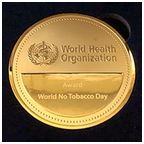World No Tobacco Day 2018 awards: winners from the WHO European Region
Извор: Светска здравствена организација – 29.05.2018

WHO
Each 31 May marks World No Tobacco Day, and in 2018 the focus will be on “tobacco and heart disease”. Cardiovascular diseases (CVD), including stroke, are the world’s leading causes of death, and tobacco use is the second leading cause of CVD, after high blood pressure.
In addition to raising awareness of and building support for tobacco control, World No Tobacco Day offers an opportunity to recognize the achievements of tobacco control champions from around the world. WHO gives the World No Tobacco Day awards every year to carefully selected individuals and/or organizations in recognition of their accomplishments in tobacco control and in the implementation of the WHO Framework Convention on Tobacco Control (WHO FCTC).
The awards recognize international achievements in the fight against the global tobacco epidemic and in the promotion of tobacco control initiatives and policies. They are awarded to individuals and institutions selected for their long-term commitment and outstanding contribution to research, advocacy, health promotion, capacity-building and other activities that promote and enforce tobacco control.
The following individuals and organizations in the WHO European Region were selected to receive a World No Tobacco Day award in 2018.
Tajikistan: His Excellency Mr Emomali Rahmon, President of Tajikistan
His Excellency Mr Emomali Rahmon has made a special contribution to the development of a healthy lifestyle among the population of Tajikistan. He has also played a key role in ensuring that tobacco control is a priority issue for the government. Under the leadership of Mr Rahmon, a new tobacco control law was developed and adopted on 2 January 2018. The new law provides for a complete ban on smoking in public places, requires pictorial health warnings to cover at least 75% of tobacco product packaging, includes regulation of nasvay (tobacco snuff), hookah and electronic cigarettes, and bans tobacco displays, advertising and sponsorship.
The adoption of the law under the strong leadership and personal commitment of Mr Rahmon was a significant achievement in the country towards stopping the tobacco epidemic.
Georgia: Dr Akaki Zoidze, Chair of the Healthcare and Social Issues Committee, Parliament of Georgia
As Chair of the Healthcare and Social Issues Committee of the Parliament of Georgia, Dr Akaki Zoidze led the process of endorsement of tobacco control legislation, which was adopted by the Parliament in May 2017 and recently entered into force. As a result, Georgia has a comprehensive tobacco control law which includes:
- a prohibition on smoking in public places
- a comprehensive ban on the display of tobacco advertising, promotion and sponsorship
- a requirement that pictorial health warnings cover 65% of tobacco product packaging
- a requirement that tobacco products have plain packaging
- regulation of e-cigarettes with nicotine as tobacco products.
Dr Zoidze led negotiations with the executive and legislative branches of the Georgian government, worked closely with the media, and coordinated work with international and civil society tobacco control organizations. Dr Zoidze was successful in overcoming the hesitation of Georgian decision-makers, and addressing the frustration of society after many unsuccessful attempts during previous years to change the legislation.
His critical contribution to substantially strengthening tobacco control in Georgia and exemplary dedication to placing health at the top of the political agenda is inspiring for policy-makers around the world.
Belgium: Ms Susanne Løgstrup, Director, European Heart Network
Ms Susanne Løgstrup has been a long-standing contributor to tobacco control and policies promoting cardiovascular health at European Union (EU) level. Under Ms Løgstrup’s leadership, the European Heart Network (EHN) has supported and funded tobacco control in the EU for over 20 years. Ms Løgstrup effectively advocated for improving the tobacco control policy framework so that tobacco-related CVD and premature death can be prevented, and consistently called for comprehensive tobacco control, as outlined in the WHO FCTC.
As Director of EHN, her role in lobbying activities around the adoption of the EU’s Tobacco Products Directive proved invaluable. Without Ms Løgstrup’s continuous commitment during the campaign, many important battles against the tobacco industry would not have been won.
Ukraine: Advocacy Center “Life”, nongovernmental organization
The nongovernmental organization (NGO), Advocacy Center “Life” is the most experienced organization in tobacco control in Ukraine, and has been effectively advocating for implementation of the WHO FCTC since 2009. The organization, with its wide network of partners and experts in and outside of Ukraine, has an impressive record of successfully realized tobacco control advocacy campaigns. Substantial tobacco control policy changes were achieved in 2009–2017, with its outstanding support. These include a 4-fold increase in tobacco taxes; a prohibition on smoking in cafés, bars and restaurants; a ban on tobacco advertising, sponsorship and promotion; and the adoption of pictorial health warnings covering 50% of cigarette packaging. These measures resulted in a significant decline in smoking prevalence: according to the results of Global Adult Tobacco Survey (GATS), daily smoking prevalence has dropped by nearly 20% during the last 7 years, from 25% in 2010 to 20% in 2017.
The achievements of Advocacy Center “Life” are appreciated by both Ukrainian partners and the international community.
United Kingdom: ASH Scotland
Action on Smoking and Health (ASH) Scotland is an independent Scottish charity taking action to reduce the harm caused by tobacco. Their vision is that everyone has the right to good health and to live free from the harm and inequality caused by smoking.
ASH Scotland was instrumental in persuading the Scottish government to announce an end-game target of a tobacco-free Scotland by 2034, one of only a few nations to have done so. The target was announced in March 2013, as part of a new, comprehensive tobacco control strategy that was informed by detailed submissions and recommendations from ASH Scotland. Since then the organization has developed a number of innovative proposals and projects to help deliver the necessary cultural and behavioural shift to a tobacco-free society. ASH Scotland was instrumental in persuading the Scottish government to announce in 2013 that it would implement plain packaging for tobacco products, successfully lobbied for Scotland’s national target to halve the number of children exposed to tobacco smoke in the home by 2020, supported the tobacco-free schools proposal and successfully advocated for a bill outlawing smoking in a vehicle with a child present.
The charity has demonstrated exceptional commitment to tobacco control, which is recognized and appreciated by the tobacco control community.
United Kingdom: British Heart Foundation
The British Heart Foundation (BHF) is a leading British NGO, whose vision is a world in which people do not die prematurely or suffer from CVD, and which has been a longstanding supporter of tobacco control. Prevention is a core element in their strategy and tobacco control is 1 of their 2 priority areas for prevention.
BHF has funded and participated in tobacco control in the United Kingdom for over 25 years. As a founder member of the Smokefree Action Coalition (SFAC) in the United Kingdom, the Foundation was instrumental in the campaign for comprehensive smoke-free legislation in England, and subsequently for the prohibition of tobacco displays and plain packaging. In addition to funding the SFAC, BHF has put its own considerable resources, its expertise and its well-known brand behind campaigning on tobacco control, running events for members of parliament, publishing reports, producing materials, and cofunding research, such as a recent evaluation of the impact of standardized packaging of tobacco products in the United Kingdom.


